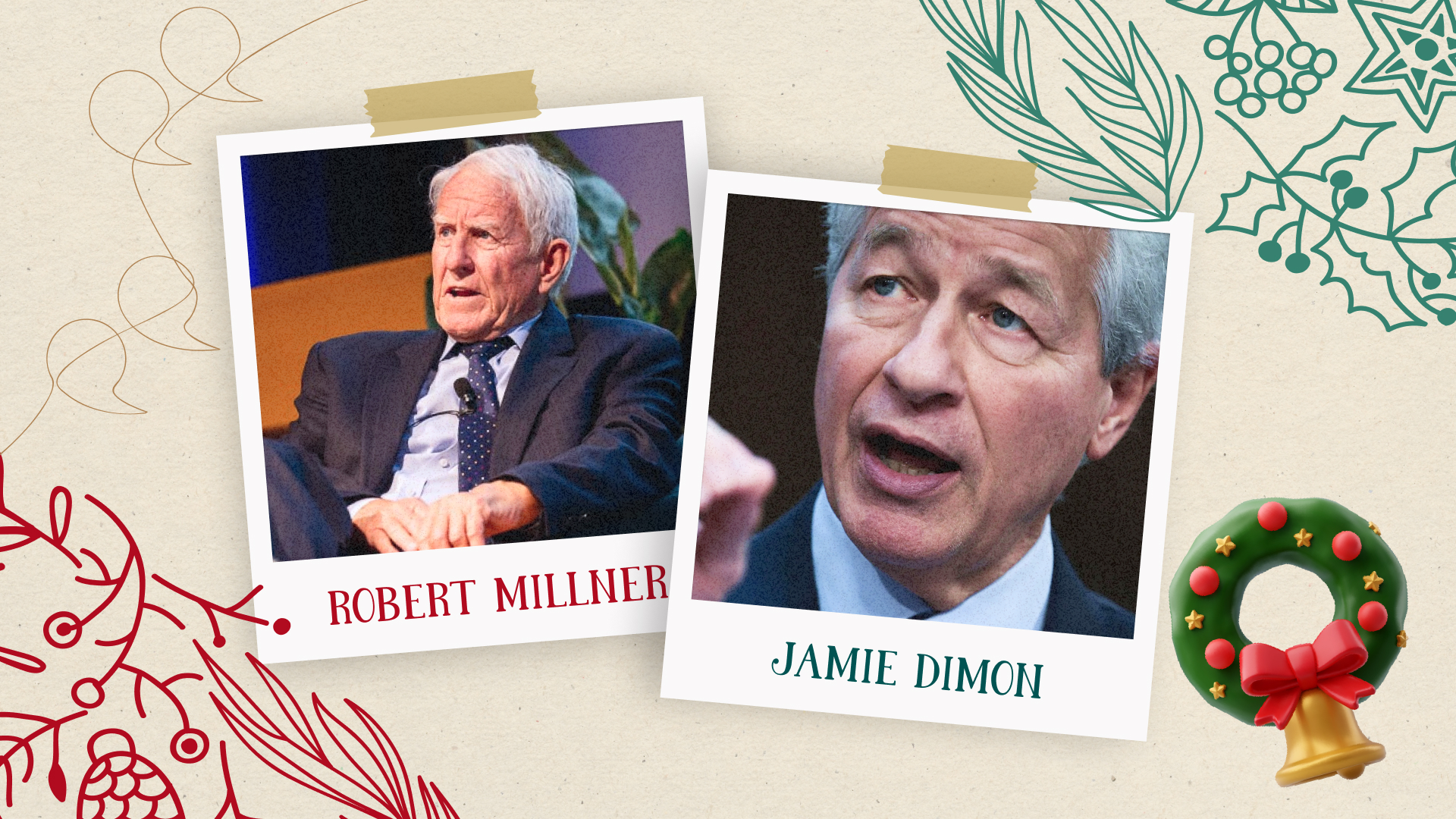11 timeless quotes to protect and grow your wealth

On the 11th day of Christmas, Livewire gave to me...
11 great investing quotes to live by
One of the great advantages of investing in the modern age is the wealth of information at our fingertips, not just about financial markets and companies, but timeless principles of wealth creation passed down through generations.
In this wire, we share 11 enduring principles to help you protect and grow your wealth, inspired by iconic figures, including those who have shared their wisdom on Livewire Markets over the years.
#1 - Always keep cash for a crash
Washington H. Soul Pattinson and Company (ASX: SOL) is a household name in Australian investing. The company has never missed a dividend since it listed in 1903 and has managed to increase payouts every year since 2000.
A big part of this success comes down to its unwavering commitment to keeping dry powder ready to take advantage of the inevitable boom-bust cycles - a principle firmly upheld by Robert Millner, who has been Soul Patts’ chairman since 1998.
“Soul Pattinson has always had cash and that's why we were able to buy the TV station after Christopher Skase and Alan Bond destroyed TV stations in Australia. These are examples of having cash and moving in at the right time. I can remember in the GFC that we had ... I can remember paying $27 for Commonwealth Bank. We were buying TPG for 14 cents, so we've always had cash.”
#2 - Management matters (a lot)
While keeping cash is important, Millner also values the same discipline in the companies he invests in.
One of his best picks is New Hope Group (ASX: NHC), a coal miner that has delivered an impressive ~250% total return over the past five years. Soul Patts owns nearly 40% of New Hope and Millner sits on New Hope's board. A key reason why NHC has survived and thrived over the years, unlike some of its peers, is because of quality management.
"It all comes from the top - with good CEOs, managing directors, and finance teams. Ensure they have skin in the game. Make sure they own shares in the company. That way, it becomes part of their life, their employment, and their financial return. The better the company performs, the better they’ll do. That alignment of interests drives disciplined decision-making."
Check out Four key lessons from Robert Millner for more nuggets.
#3 - Avoid thy classic dividend trap
Australian investors love dividends, but the total returns of many major income stocks have struggled to keep pace with inflation, particularly in recent times. Over the past decade, Telstra has delivered just over 5% p.a., while the banks (excluding CBA) have achieved only 0.3% to 2.7% annually, according to Market Index data.
These companies often fall into the category of dividend traps - paying out unsustainably high dividends on the one hand, while bleeding out capital growth on the other, resulting in mediocre overall returns.
That’s why Dr Philipp Hofflin of Lazard Asset Management highlights a critical nuance for income-focused investors.
"We will not buy a stock if it doesn't have capital upside. Just because the dividend is nice, it doesn't mean that you want to lose money on capital. We do not want to trade those two off."
Learn more in this wire: How Lazard's Philipp Hofflin uses 150 years of data to find the best ASX income stocks.
#4 - If it sounds too good to be true... then just don’t!
CBA’s share price recently broke through $150, delivering an impressive 10.19% annual return and comfortably outperforming its Australian peers over the past decade. But in the U.S., JPMorgan Chase & Co. sets an even higher bar as the country’s largest bank, boasting a $1 trillion market cap (4x bigger than CommBank) and annual returns of over 16% over the same period.
A big part of JPMorgan’s success comes down to its CEO, Jamie Dimon. Known for his no-nonsense style, Dimon has led the bank since 2006, steering it through multiple financial crises with a focus on avoiding excessive risk and speculative bets.
“If you’re stupid enough to buy it, you’ll pay the price for it one day.”
It’s a sharp reminder for investors to stick to long-term, diversified strategies instead of chasing quick wins or falling for schemes/scams that promise unreasonably high returns.
#5 - Think slow: A way to save yourself from bad trades
Avoiding scams is important, but hasty decisions can be just as damaging for investors. Whether it’s acting on a quick stock tip from a cab driver or jumping into a "hot" trade, it’s easy to end up with a $1,000 loss and a hard lesson learned.
That’s why we love this investing insight from award-winning fundie Kate Howitt, who retired from funds management after 18+ years as a portfolio manager at Fidelity International and left us with this timeless piece of advice:
“Nobel Laureate Daniel Kahneman, in his book Thinking, Fast and Slow, explains how humans evolved to make snap decisions to conserve energy - great if you’re running from a tiger, but not so much for investing. To succeed as an investor, you need to shift into slow thinking. Develop your own habits and processes to ensure your decisions come from a thoughtful, deliberate mindset.”
Her wisdom, covered in Kate Howitt’s Secrets to winning the long game, reminds us that thoughtful investing beats impulsive action every time.
#6 - Start small, watch, and learn
For young investors, building knowledge is key, and Catherine Allfrey, portfolio manager and director at WaveStone Capital, offers some valuable guidance. Her advice? Read lots, listen to experts, and let your observations guide you.
“[My] advice for young investors is to read and listen to everything – the Australian Financial Review, Livewire, podcasts like All In, NAB’s Morning Call, the Wall Street Journal. Think about what products and services you love or hate – avoid these stocks – and then start researching.”
It’s a reminder that investing starts with curiosity. By consuming a diverse range of news and insights, and combining it with personal experiences, you can identify opportunities worth exploring - or avoiding.
#7 - But if you don’t have time, just buy an ETF!
While Allfrey urges young investors to dive into research, the affable Warren Buffett offers a simpler approach for those short on time or don’t have the patience for research, stock selection and financial news. In his 2013 Berkshire Hathaway letter, he wrote:
“The goal of the non-professional should not be to pick winners…but to own a cross-section of businesses that in aggregate are bound to do well. A low-cost S&P 500 index fund will achieve this goal.”
For investors seeking market exposure without the hassle of stock picking, a low-cost ETF tracking the S&P 500, potentially combined with Australian market exposure, provides a simple, efficient way to access the growth of major companies while benefiting from regular dividends, diversification, and liquidity, all at a low cost.
#8 - Buy low, sell high
Hetty Green, America’s first value investor and the “Queen of Wall Street” during the Gilded Age, embodied patience and against-the-herd thinking - qualities that remain as relevant today as they were in her time. Her strategy was both simple and timeless:
“When good things are so low that no one wants them, I buy them and lay them away in the safe; when owing to some new development, they go up and my shares are so needed that men will pay well for them, I am ready to sell.”
However, her success wasn’t just about timing; it was built on meticulous research. She made it a point to thoroughly understand every company she invested in, ensuring she was ready to act decisively when the time was right.
#9 - that critical moment between buying and selling is the most important
Green’s strategy of buying undervalued assets and waiting for their moment of need aligns perfectly with the wisdom of Buffett's right-hand man, the late Charlie Munger:
“The big money is not in the buying and selling, but in the waiting.”
True wealth is built by holding well-researched investments long enough to realise their full potential. Both Green and Munger remind us that success isn’t just about timing or research; it’s about having the discipline to wait.
#10 - don't forget markets climb 'the wall of worry'
Market crashes and bull runs are inevitable, and navigating them requires focus and emotional resilience. Geoff Wilson AO, one of Australia’s most respected investors, offers a timeless perspective on how to stay grounded through market ups and downs:
“One of the things you’ve got to do is you’ve got to work against your emotions. You’ve got to accept that it’s always different. The ’87 crash was the market falling 10%, and then on one day falling significantly. You’ve got to play what’s in front of you in terms of the market, because every market dislocation is different. That’s on the negative side. On the positive side, every bull market climbs a wall of worry. We’re always nervous on the way up in the bull market. One of the good things about bear markets is they’re a lot shorter than bull markets. What we do know as an investor is that equity markets over time deliver you exceptional returns.”
Check out more in Geoff Wilson’s principles for dealing with a crisis.
#11 - Don’t worry about what your neighbours bought
Lastly, as Christmas approaches, many of us may succumb to social comparison theory - the tendency to measure our financial status against that of our neighbours and friends (better known as “keeping up with the Joneses”).
It’s easy to feel the pressure when your neighbour rolls up in a shiny new Audi, boasting about the massive Lego sets and Nintendos under their Christmas tree, while you’ve chosen a thoughtful investing book from Dymocks and are still driving your reliable 2015 Toyota Corolla.
But John Pierpont Morgan Sr., the legendary American banker who founded JPMorgan, put it best:
“Nothing so undermines your financial judgment as the sight of your neighbour getting rich.”
Luxurious purchases often come at a hidden cost, frequently funded by ballooning credit card debt or costly lines of credit that leave people financially strained for years (buy now pay later, anyone?) Meanwhile, those who choose balanced spending habits are more likely to enjoy a happy, debt-free retirement.
The lesson here is to not let appearances dictate your financial decisions. True wealth comes from thoughtful choices, consistent investing, and exercising restraint when necessary - not from fleeting comparisons.
And on that, here’s to you and your family becoming smarter investors in 2025!
1 topic
2 stocks mentioned
4 contributors mentioned

